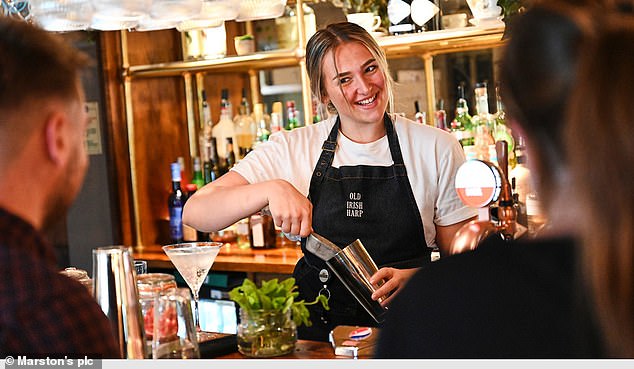- Marston reported underlying net losses of £0.6m in the six months to March.
- Trade outperformed the broader market, thanks to strong holiday demand
Marston’s is hoping major sporting events will revive sales this summer as the pub operator posted another first-half loss.
The Wolverhampton-based company reported underlying net losses of £0.6m in the six months to March, down from £2.9m in the equivalent period last year.
Trading outperformed the broader market thanks to strong demand during the festive season and higher food and beverage orders that boosted comparable sales by 7.3 percent.
Here’s to that: Marston’s reported underlying net losses were £0.6m in the six months to March, down from £2.9m in the equivalent period last year.
However, on a legal basis, the company’s losses increased by around 27 per cent to £36.6 million due to interest rate swap liabilities of £25.8 million and a one-off charge related to the impairment of CMBC’s beer brand and the onerous provision of the contract.
Marston’s expects to perform better in the second half of the financial year, when it tends to achieve higher revenue, profits and cash flow due to sunnier weather.
But the company also plans to benefit from the various major sporting events during the summer, when the Paris Olympic Games and the European Football Championship will take place.
The British hospitality industry hopes the extensive sporting calendar in the coming months will boost trade after multiple challenging years defined by the Covid-19 pandemic and cost of living pressures.
For Euro 2024, the UK government has said pubs will be able to stay open for an extra two hours on match days if England or Scotland reach the semi-finals, which could provide another boost in sales.
Justin Platt, chief executive of Marston’s, said: “With a number of major ‘not to be missed’ sporting events, our greatly improved pub gardens and much-loved food menus, we expect our pubs to be very popular this summer.”
Beyond the summer, Marston’s believes it will continue to benefit from the pandemic-induced shift to remote working, driving more sales in rural and suburban areas, where much of its pub is located.
However, the group remains beset by debt of £1.2bn, more than five times its market capitalization of £206.4m.
It aims to reduce debts to less than £1bn by 2026, partly by selling some pubs, with £50m in off-licence and ancillary property sales forecast this financial year.
Platt added: “With our high-quality team obsessed with properties and guests, we are well positioned to capitalize and deliver consistent, reliable cash flows that will create value for our shareholders.”
The former Merlin Entertainments executive took over as Marston’s chief executive in January, when Andrew Andrea resigned after two decades working for the company, which runs around 1,400 pubs across Britain.
Marston’s actions fell 2.5 per cent to 32.9p on Tuesday afternoon, well below its pre-Covid level.


